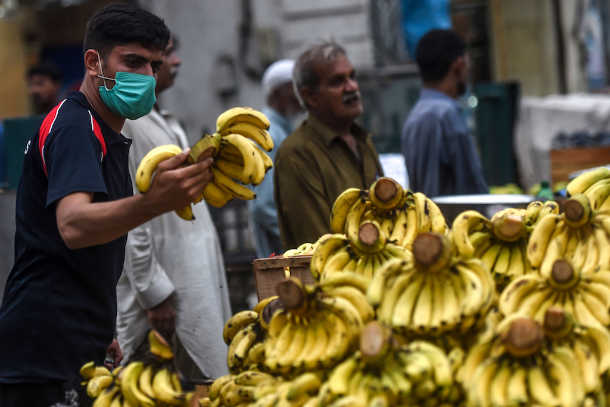
A man buys bananas in Pakistan's port city of Karachi on Aug. 6. Pakistan on Aug. 6 announced it would be lifting most of its coronavirus restrictions after seeing new cases drop for several weeks. (Photo: Asif Hassan/AFP)
Yasir Javed still remembers being the only Catholic salesman in Lahore’s historic Anarkali Bazaar.
“It was a toxic work environment. The traders used to ask controversial questions regarding Christianity. They used to refer to former batsman Yousuf Youhana, a Christian who converted to Islam,” Javed told UCA News.
“I could dine with the staff but my glass of water was always kept separately. The depression brought me closer to my church.”
In 2010, after working for three years for a Muslim cloth seller in Anarkali, the former Sunday school teacher left the job. Two years later, he became the vice-president of the Catholic Youth Ministry of Sacred Heart Cathedral.
Javed was among more than 1,000 youngsters from Pakistan’s seven dioceses and 30 priests who attended the inaugural ceremony of the Year of Youth 2020 at Lahore Cathedral in November 2019. The six bishops, who concelebrated Mass, proclaimed focusing on educating, strengthening and making young Catholics more independent economically.
In a pastoral letter, Bishop Samson Shukardin, program coordinator for the Year of Youth, urged clergy, lay associations and church groups “to look forward to having trained youth leaders, mentors and spiritual directors who can accompany young people and help them to overcome the challenges they are facing in daily life.”
Following the celebrations and Bhangra, a Punjabi cultural dance, to the beat of a dhol (Indian drum), Javed interviewed Father Francis Gulzar, vicar general of Lahore Archdiocese, for further guidance. Bring back those involved in drugs and crime, suggested the priest. That was his last session in the year-long observance.
The challenges
“The priest made it clear that the Church is not offering jobs or organizing big gatherings. But we were left on our own. There were no follow-up meetings. Only youth members discuss their issues on social media, especially after the coronavirus outbreak,” said Javed.
“Most of the members of Catholic youth groups are students. They find it hard to fund any initiative from their pocket money. In typical youth training, most of the participants are candidates from formation houses. A parish will only develop when its own people are involved, beginning with the youth.”
Church leaders claim young Christian Pakistanis grow up confronted by religious discrimination and financial challenges. Limited access to education amid the coronavirus lockdown has added to their frustration, they say. The representation of Christians in menial cleaning jobs is very high.
Educational institutes nationwide were closed abruptly in late February as a precautionary measure against the pandemic. Pakistan has confirmed more than 280,000 cases including more than 6,000 deaths, though observers fear a higher number with only limited testing.
Caritas Pakistan has been providing psychosocial kits to young people in all six dioceses and one apostolic prefecture.
Last week Bishop Shukardin inaugurated an academy for the preparation of central superior services (CSS) exams at Excellency Center in Hyderabad Diocese.
The preparatory course was specially designed to help young men and women prepare for the CSS exam, which is conducted annually to recruit people for top government positions. Twelve candidates from cities in Sindh province have registered at the academy.
The Diocese of Multan and the diocesan unit of Caritas Pakistan inaugurated St. Peter’s CSS academy in June. Seventy-five students registered.
In July 2019, Archbishop Joseph Arshad of Islamabad-Rawalpindi inaugurated a six-month preparatory course for young Catholics at St. Mary’s Cambridge School in Rawalpindi.
“The Year of Youth went with a bang for the first few months but then the pandemic spoiled our plans. Several dioceses conducted individual programs and are now in contact with youth groups via the internet. Much work needs to be done,” said Bishop Shukardin.
Earlier this year, Punjab’s government for the first time set a quota for students belonging to religious minorities in higher education institutes in a measure long sought by activists.
The provincial cabinet on April 30 approved a 2 percent quota for non-Muslims in universities under its Punjab Minorities Empowerment Package. Christians account for around 2.5 percent of Pakistan's population of 220 million, according to the 2017 national census.
However, Rubina Feroze Bhatti, consultant at the Human Rights and Minorities Affairs Department in Punjab, stressed the further need for “liaison building” in Islamic society.
“In a decade, the quota might produce technical experts from the middle class, but the Church will remain leaderless. Besides providing education, equal efforts should be made to develop linkages with stakeholders. Interfaith groups should go beyond peace sessions. Building trust and acceptance can help mainstreaming minorities and attain good standing among professionals,” she said.
“The current church leadership has to soften its boundaries and engage others for collaboration. The traditional model of leadership and rigid rules must be replaced with flexibility and youth empowerment for real integration.”
Bhatti was speaking at a recent webinar titled “Christian youth in Pakistan; past, present and future.” The speakers recommended Christian charity groups to focus more on the community as well as urging educationists to offer more training, career counseling and scholarships to Christian students.
UK-based Father Emmanuel Nazir, one of the webinar organizers, is hopeful of change. “Christian students didn’t study beyond grade 10 in the past. The community is more sensitized, but ground realities stop them from developing. Forced conversion of minority girls is another challenge,” he said.


